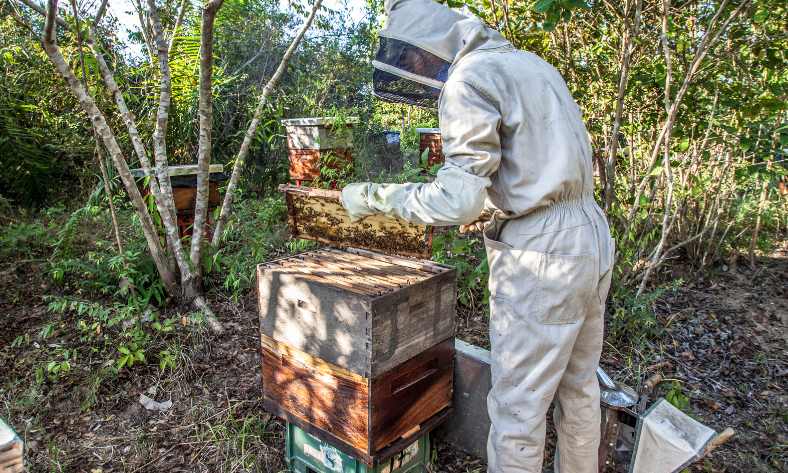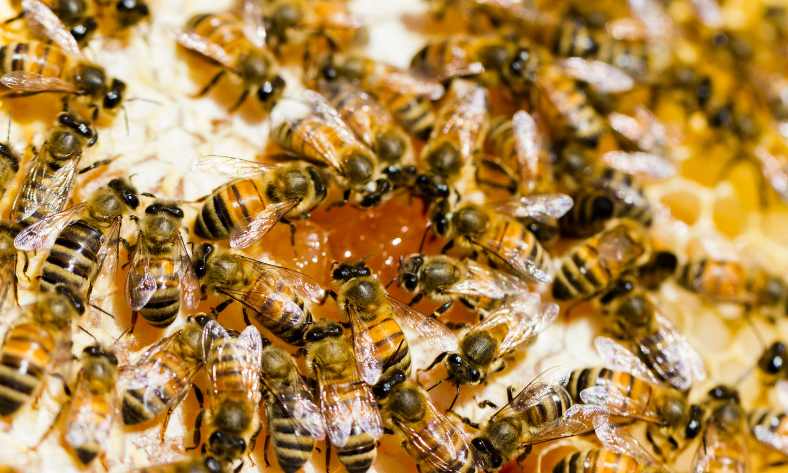As the guardians of our beloved honey bees, beekeepers play a crucial role in maintaining healthy hives and ensuring the survival of these important insects. But with the majority of a beekeeper’s tasks occurring during the day, one may wonder: do beekeepers work at night?
In this blog post, we will delve into the daily routine of a beekeeper and explore the special circumstances that may require them to work after dark. We will also discuss the challenges of working at night as a beekeeper and consider the reasons why some may choose to do so.
Can beekeepers work at night?
As the world becomes increasingly aware of the importance of bees in our ecosystem, the role of the beekeeper becomes even more vital. These dedicated individuals are responsible for maintaining healthy hives and ensuring that bees are able to thrive. But do beekeepers work at night?
The answer is not a straightforward one. While the majority of a beekeeper’s work occurs during the day, there are certain circumstances in which they may need to work at night. Let’s take a closer look at the daily routine of a beekeeper and the special circumstances that may require them to work after dark.
The daily routine of a beekeeper
A beekeeper’s day typically begins early in the morning, when the bees are most active. The first task of the day is often checking on the health of the hive and the bees. This may involve inspecting the hive for any signs of disease or pests, and ensuring that the bees have enough food and water.
In addition to checking on the health of the hive, a beekeeper may also need to collect honey. This involves carefully removing the honeycomb from the hive and extracting the honey using a special machine. Once the honey has been extracted, it is filtered and bottled for sale.
Another important task for a beekeeper is maintaining the equipment used in the hive. This may include cleaning and repairing bee suits, hive tools, and other equipment.
So, do beekeepers work at night? While the majority of these tasks are performed during the day, it is possible for a beekeeper to check on the hive after dark. This may be necessary if the beekeeper notices any unusual behavior in the bees or if there are concerns about the health of the hive.

Special circumstances in which beekeepers may work at night
While working at night is not a regular part of a beekeeper’s job, there are certain circumstances in which it may be necessary. One such situation is when bees are swarming.
Bees swarm when they are preparing to reproduce and create a new colony. The process begins when a group of bees, including the queen, leaves the original hive and begins searching for a new home. During this time, it is important for the beekeeper to monitor the swarm and ensure that it does not establish itself in a location that is not suitable for a hive. If the swarm is not caught and relocated by the beekeeper, it may cause problems for the surrounding community.
Another situation in which a beekeeper may need to work at night is when there is a disease outbreak in the hive. Some diseases, such as American foulbrood, can spread rapidly and can be fatal to the entire hive if left unchecked. In these cases, the beekeeper may need to work at night in order to minimize the spread of the disease and protect the hive.

The challenges of working at night as a beekeeper
Working at night presents a number of challenges for beekeepers. One of the most obvious difficulties is the issue of visibility. It is much harder to see inside the hive and navigate around it when it is dark outside. This can make it more difficult for the beekeeper to identify any problems with the hive or the bees.
In addition to the issue of visibility, working at night also presents a higher risk of accidents or injuries. It is easier to trip or fall when it is dark, and it can be more difficult to see any potential hazards.
Despite these challenges, some beekeepers may choose to work at night in order to avoid the heat of the day or to minimize disruption to the bees. Bees are most active during the day, and working at night can help to avoid disturbing them while they are busy collecting nectar and pollen.
Wrapping it up
In conclusion, while the majority of a beekeeper’s work occurs during the day, there are certain circumstances in which they may need to work at night. This may include situations such as bee swarms or disease outbreaks in the hive that require immediate attention.
Working at night presents a number of challenges for beekeeping, including poor visibility and an increased risk of accidents or injuries. However, some beekeepers may choose to work at night in order to avoid the heat of the day or minimize disruption to the bees. Regardless of the time of day, it is clear that beekeepers are dedicated and hardworking individuals who play a vital role in protecting and supporting the health of our honey bees.

Hi – I’m Erika, the head writer and expert beekeeper here at Just Beekeeping! I am a backyard beekeeper and proud member of the American Beekeeping Federation (ABF) and the Central Indiana Beekeepers Association. In addition, I am an educator with advanced degrees from UC-Berkeley and the University of Southern California (USC). I use my expertise to help others learn about beekeeping, and I am an advocate for all subjects bee related!